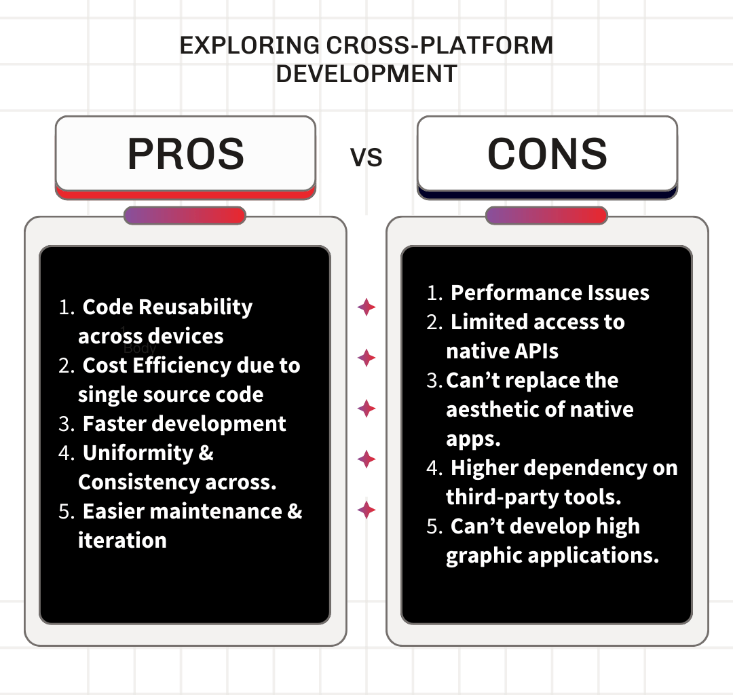Beyond React Native: Exploring Alternative Cross-Platform Framework-Flutter (2024 Guide)
In the IT industry, mobile app development can be done in different ways. This gives developers and the clients enough flexibility to choose the right approach that works for them.
Recent times have dictated an increasing use of cross-platform development, with the market crossing $546.7 billion by 2033 (GlobeNewswire)
This approach allows for a widened range of mobile app development across industries like Fintech, Retail, Manufacturing, Telecom, and more.
Developing cross-platform reduces the heavy need for investment, while gaining a bigger demographic of users. Let’s explore cross-platform app development further & it’s technical know-hows in this blog.
What is
Cross Platform App Development?
In app development, a cross-platform framework acts as a catalyst for heightened efficiency, performance, and usability. It solves many issues for users and dedicated developers alike.
In totality, cross-platform development refers to developing applications that work perfectly on all formats of devices & operating systems.
This approach has changed the way apps are developed now. Most of the dedicated developers rely on the cross-platform development approach to reduce the burden that native apps bring.
In fact, in 2021, 63% of developers opt for cross-platform development, citing cost-effectiveness, reduced development times, and wider audience reach as the main motivators to do so.
However, the same approach also brings forth several loopholes that all IT services companies must be aware of. Take a look.

1. Code reusability:
Cross-platform development gets streamlined due to code reusability. This results in significant time savings & less effort. Developers can easily write the code once & seamlessly deploy it throughout multiple platforms.
2. Code efficiency:
By leveraging a single codebase for multiple platforms, developers don’t need to make and maintain different native apps, increasing the process’s cost-effectiveness by a lot.
3. Faster Development:
Having a reusable code allows for faster development as compared to native app development, which takes multiple sources of code for each platform.
4. Uniformity & Consistency:
While developing cross-platform, using a single codebase offers design & overall UX consistency on all platforms & devices.
5. Easier maintenance & iteration:
Any updates and maintenance efforts get organized owing to a single cross-platform code. If a developer makes any changes, they get automatically reflected on all chosen platforms.
1. Performance issues:
Cross-platform apps may demonstrate some performance lags as compared to native apps. These apps interact with the device hardware through an additional layer, lowering speed & efficiency.
2. Less access to native APIs:
Many cross-platform development frameworks offer multiple native APIs, but not all. This restricts an app’s ability to use all the specific functionalities on platforms, compromising the user experience.
3. Can’t replace native apps:
While cross-platform frameworks are constantly evolving to emulate a native app’s design, getting a perfect match can be hard. Thus, increasing inconsistencies in the UI/UX of the app.
4. High dependency on third party tools:
This development hinges on third-party tools & frameworks. Even though convenient, they can cause potential compatibility issues, in case they don’t get periodically updated.
5. Issues with graphics:
Cross-platform development might not be the ideal fit for apps relying heavily on complex 3D graphics or intricate animations. Native development often delivers superior performance in these scenarios, enabling a smoother and more visually impressive user experience.
Now that we understand the benefits & limitations of cross-platform development, let’s see the considerations while choosing the right framework.
While choosing the right framework, dedicated developers must realize the intensity of the decision. It’s like picking the perfect foundation of success- a rock-solid choice ensures a constantly stable application that attracts a lot of users.
By considering the following variety of factors, one can avoid pitfalls and select a framework that perfectly aligns with the project’s unique needs:
1. The Need for Speed (across devices)
Any app’s maker wants it to run smoothly on any platform- be it a high-end iOS phone, or a more modest device. That’s where developers consider the ‘performance’ of an app.
When choosing a cross-platform framework, dedicated developers must consider how well the code would play out across different devices. This results in the app being responsive with a great user experience, no matter what platform.
2. A Robust Ecosystem for Consistent Development
There needs to exist a large and active developer community around a cross-platform framework. This offers multiple advantages such as:
- – A proactive community allows dedicated developers to connect, network and troubleshoot major challenges collectively.
- – Established communities often allow collective access of extensive documents, tutorials, code snippets- often proving to be a valuable resource for constant learning & development.
- – Such communities eventually contribute to the framework’s growth with plugin developments, bug fixes, and feature enhancements. This ensures the platform’s relevance and functionality.
3. Overall Syntax Similarity & High-Quality Documentation
Ideally, the chosen framework must leverage a clear & concise syntax that’s like known programming constructs, heavily reducing the cognitive load for dedicated developers.
With this, well-researched & formatted documents serve as crucial references, providing in-depth answers, explanations, APIs, and code examples.
4. Bridging the Gap to External Next Gen Tools
The ability to seamlessly integrate with third-party libraries, plugins, and other services becomes a crucial consideration while choosing cross-platform frameworks in this age.
The integration capability develops a more extensible development environment, allowing dedicated developers to leverage existing functionalities & external data sources.
Solid frameworks, thus, simplify the process of incorporating the external components in an application. In turn, developers focus on core application logic & deliver feature rich UX to the users.
5. Powerful development & debugging is key while developing an application. So, the right tools and frameworks simplify the process and allow developers to fix issues efficiently. This results in faster development cycles, easier debugging, and smoother workflows.
6. Lastly, for long-term success, developers must choose a scalable framework that effortlessly adapts to the application’s growth. This enhances the app’s ability to handle increasing user traffic & data needs without compromising on performance.
Getting to Know &
Flutter as a Cross-Platform Development
Framework in 2024
It’s realistically possible to build intuitive apps like Google Ads & Microsoft Teams by simply hiring Flutter mobile app developers to implement your concepts.
Google’s open-source UI framework, Flutter, introduced in 2017, lets developers craft intuitive UIs across many platforms, like iOS, Android, web, Windows, and Linux- by using a single codebase.
This easily streamlines development for full stack Flutter developers in India, while future-proofing applications by expanding them to new platforms when needed.
Flutter used to initially focus on mobile apps, but now its extended versatility runs through a wider range of devices.
Flutter simplifies making beautiful & consistent Uis for all the platforms it supports. This results in building native-looking apps with just one codebase. The power of Flutter shows through just this one feature of it!
1. Efficient application development
Due to its single codebase & UI engine for both Android & iOS, development times get significantly reduced as compared to building separate native apps.
But its benefits go beyond just this reusability.
Flutter’s hot reload feature, powered by JIT compilation, lets developers see code changes reflected instantly within a running app. This fastens up the testing & update process, allowing IT services companies to release new features & applications to market faster.
This sets Flutter as the ideal platform for building Minimum Viable Products (MVPs) to test out markets & preliminary iterations.
2. Learn Once, Build Anywhere
Flutter uses Dart, a beginner-friendly language known for its clean syntax & high readability. This makes It super easier for developers to start and build one random day.
Its extensive widget library also provides pre-built UI components for common functionalities, allowing app development with less custom coding. Some platforms even use the no-code development with Flutter!
Lastly, Flutter acts like a comprehensive manual with a wealth of resources at the disposal for all dedicated developers.
3. Libraries & logic
Flutter uses the open-source Skia Graphics Library because of its speed and advanced features. This gives the created apps a smooth and responsive user interface (UI).
The result?
Faster app launches and a seamless user experience.
This framework allows developers to build Uis without relying on platform-specific components.
Assume the UI is a blank canvas. Flutter offers developers the leeway to create entirely unique interfaces. This, combined with its well-defined API for UI development, boosts up performance whilst giving creative freedom to the developer.
4. Native-like functionalities
Flutter manages to bridge the gap between native app development and the efficiency cross-platform development gives. It leverages the strengths of native Android languages while providing a unique approach.
Instead of wrapping existing apps, Flutter utilizes Platform Channels for seamless communication between the framework and native code, allowing access to essential device features. Its recent library updates have made AR functionalities available to dedicated developers.
The performance that Flutter apps offer is impressive, often indistinguishable from native apps, and even surpassing them in scenarios with complex UI animations.
In essence, Flutter offers the best of both worlds: the power and performance of native development with the flexibility and efficiency of cross-platform frameworks.
5. Boosting the performance
Flutter carries a varied approach to building apps for various platforms and operating systems. It compiles code into native binaries and leverages the power of C/C++ graphics & rendering engines.
Through this, developers create the fastest and most responsive apps ever, delivering a smoother-than-ever UX.
Dedicated developers also get access to specialized tools such as Flutter Inspector, Data Analysis, etc. These help teams analyze code, pinpoint performance bottlenecks, and help them adhere to the best standard practices.
6. Cost-effective Development
Flutter’s functionalities let developers build intuitive apps faster. Its extensive widget library carries pre-built components for commonly preferred UI elements, reducing the time and efforts to custom code from scratch.
This results in:
- – Less development time
- – Faster launches to the market
- – Cross-platform functionality
7. Focus on UX & user engagement
Today’s apps demand a well-thought-out and intuitive user interface no matter the industry. Flutter stands true in its power, training dedicated developers to create beautiful user experiences.
Its wide variety of widgets isn’t just aesthetically pleasing, but also high performing, catering for efficient UI development. Through this, Flutter streamlines UI creation, making it easier to design both simple interfaces & complex layouts with multiple components.
Additionally, Flutter compiles the code directly to the native code. This reduces performance issues further.
We love making intuitive apps, and boy, do we excel in it. It’s been around 10+ years and 300+ apps, and we’re more unstoppable than ever.
Our team of tech experts develop faster and iterate way better. By leveraging our agile expertise, we guarantee success, and a market-breaking one at that.
Don’t forget to check out our success stories today!









